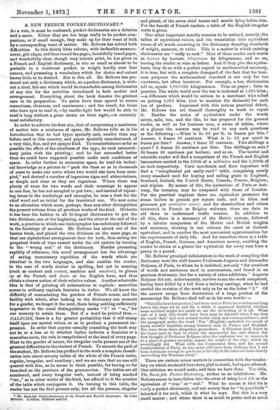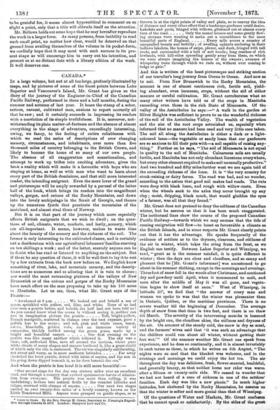A NEW FRENCH POCKET-DICTIONARY.* As a rule, it must be
confessed, pocket-dictionaries are a delusion and a snare. Either they are too large really to be pocket-com- panions, or if small enough, they make up for their want of bulk by a corresponding want of matter. Mr. Bellows has solved both difficulties. In this dainty little volume, with its flexible morocco- cover, gilt edges, red lines round the page; beautifully toned paper, and wonderfully clear, though very minute print, he has given us a French and English dictionary, in size so small as almost to be portable in a waistcoat pocket, in weight hardly over four ounces, and possessing a vocabulary which for choice and extent leaves little to be desired. Nor is this all. Mr. Bellows has pro- duced not only a dictionary which, as a pocket-dictionary, is with- out a rival, but one which would be remarkable among dictionaries of any size for the novelties introduced in both matter and arrangement. Everything about the book denotes the greatest care in its preparation. No pains have been spared to secure correctness, clearness, and conciseness ; and the result, for those who have eyes to read it,—by candle-light few would be able to read it long without a great strain on their sight,—is certainly most satisfactory.
In order to achieve his first aim, that of compressing a maximum of matter into a minimum of space, Mr. Bellows tells us in his Introduction that he had types specially cast, smaller than any before used in this country, and paper specially manufactured, of a very thin, fine, and yet opaque kind. To counterbalance as far as possible the effect of the smallness of the type, he took extraordi- nary pains with the printing ; and he has succeeded better than we could have supposed possible under such conditions of space. In order further to economise space, he used his techni- cal knowledge as a printer to "pack the lines so as in thousands of cases to make one serve where two would else have been occu- pied," and devised a number of ingenious signs and abbreviations, as simple and clear as they are ingenious. Where there was plenty of room for two words and their meanings to appear in one line, he has not scrupled to put two ; and instead of repeat- ing terms in the renderings and examples, he uses a dash for the chief word and an initial for the translated one. We now come to an alteration which more, perhaps, than any other distinguishes the present volume from all previous works of the kind. Hitherto it has been the fashion in all hi-lingual dictionaries to put the two divisions, one at the beginning, and the other at the end of the work, a practice in which one lexicographer has sedulously followed in the footsteps of another. Mr. Bellows has struck out of the beaten track, and placed the two divisions on the same page, so that one alphabetical arrangement does for both, thus saving the perpetual waste of time caused under the old system by turning to the "wrong end" of the dictionary. Besides promoting rapidity of reference, this nover arrangement has the advantage of saving unnecessary repetition of the words which are identical in the two languages, and also enables the reader, in the case of words similar in spelling, but not in meaning (such as content and content, machine and machine), to glance up at the French and down at the English form, and thus obtain a clearer notion of their relative values. Another admirable idea is that of printing all substantives in-capitals : masculine nouns in ordinary capitals, feminine in italics. We all know the difficulty of remembering the genders of French nouns, and the facility with which, after looking in the dictionary one moment for a gender, we forget it the next, there being nothing sufficiently impressive in the usual distinguishing marks "f." or "in.," for our memory to retain them. But if a word be printed thus, — CALECHE, there is a far greater probability that it will stamp itself upon our mental retina, so as to produce a permanent im- pression. In order that anyone casually consulting the book may not be at a loss as to whether italics indicate a feminine or a masculine noun, the rule is recapitulated at the head of every page. Next to the gender of nouns, the irregular verbs present one of the greatest difficulties to the student of French. To smooth the path of the student, Mr. Bellows has prefixed to the work a complete classifi- cation into about seventy tables of the whole of the French verbs, regular, irregular, and auxiliary ; and we are sure that no one will quarrel with him, as he seems to think possible, for having so far trenched on the province of the grammarian. The tables are all numbered, and every irregular verb, instead of being marked
as in other works of the kind, has affixed to it the number of the table which conjugates it. On turning to this table, the reader has not the first persons only, but all the persons, singular
The Bond-fide Podet-Dietionary of the French and L'nglish Languages. By John Bellows. London: Trilliner and Co.
and plural, of the seven chief tenses and moods lying before him. For the benefit of French readers, a table of the English irregular verbs is given.
One other important novelty remains to be noticed, namely, the tables of equivalent values, and the translation into equivalent terms of all words occurring in the dictionary denoting standards of weight, measure, or value. This is a matter in which existing dictionaries are "sadly to seek." Most of them render such words as hectare by hectare, kilogramme by kilogramme, and so on, leaving the reader as wise as before. And if they give the equiva- lents, they do so with a perfect regard to mathematical accuracy, it is true, but with a complete disregard of the fact that for busi- ness purposes the mathematical standard is not only far too cumbrous, but often incorrect. For example, a ton, dictionaries tell us, equals 1,016.048 kilogrammes. True on paper ; false in practice. The whole world over the ton is reckoned at 1,015 kilos., —a difference which would be serious to a merchant who relied on getting 1,016 kilos. (not to mention the decimals) for each ton of produce. Impressed with this serious practical defect, Mr. Bellows has set himself thoroughly to work to repair it. Besides the series of equivalents under the words metre, mile,' ton, and the like, be has prepared for the general reader, as well as for business men, a series of tables, where at a glance the answer may be read to any such questions as the following :—What is 2s. 6d. per lb. in francs per kilo. ? Answer, 6 francs 87 centimes. What is is. 3d. per quart in francs per litre ? Answer, 1 franc 37 centimes. Two shillings a quart ? 2 francs 20 centimes per litre. Ten shillings an acre ? 30 francs 88 centimes per hectare ; and so on. The tourist and scientific reader will find a comparison of the French and English barometers carried to the 100th of a millimetre and the 1,000th of an inch respectively. Corti merchants and flour importers will find a "complicated yet easily-read" table, comprising nearly every standard used for buying and selling grain in England, Scotland, Ireland, the United States, Canada, France, Belgium, and Algiers. By means of this, the quotations of Paris or Ant- werp, for instance, may be compared with those of London. For the practical engineer there are equivalent pressures for steam boilers in pounds per square inch, and in kilos. and grammes per centimetre carre ; and for shareholders and others interested in French or Belgian railways, there are data to aid them to understand traffic returns. In addition to all this, there is a summary of the Metric system, followed by a tabular comparison of the Metric and British weights and measures, showing in one column the exact or decimal equivalent, and in another the most convenient approximation for the requirements of daily life. And for travellers there is a table of English, French, German, and American money, enabling the reader to obtain at a glance the equivalent for every sum from a penny to a pound.
Mr. Bellows' principal collaborators in the work of compiling this dictionary were the well-known Professors Auguste and Alexandre Beljame, of Paris, to whom he is indebted, not only "for numbers of words and sentences used in conversation, and found in no previous dictionary, but for a variety of other additions." Auguste Beljame did not, unfortunately, survive to see the work completed, having been killed by a fall from a railway carriage, when he had carried the revision of the work only as far as the letter "I." Of the narrow escape from destruction of a large portion of the manuscript Mr. Bellows shall tell us in his own words :—
"This [the heaviest portion] had been sent to Paris for revision not long before the siege set in, and for a while it appeared doubtful whether some accident might not entail on me the re-writing of it alL What sort of a. task this would have been may be inferred when I say that the word 'Sail' had cost several weeks' study and correspondence ;,and the paragraph under the word 'Ton' (English) embodied the result of many months' inquiries among business men in France and England. Nor were these fears altogether groundless. A Prussian shell burst in the house next to that in which the manuscript lay, and almost the first thought of Professor Beljame after the explosion was to remove it to a place of greater security, nearer the centre of the city ; which he accordingly did. What with the Communist fires, and the second bombardment of Paris, its fate must still have been dubious, had I not been fortunate enough to get it out of the city in the interval immediately succeeding the Prussian entry."
There are various minor matters in connection with the vocabu- lary on which we should have been glad to touch, bad space allowed. One criticism we would make, and then we have done. The title, The Bond-fide Pocket-Dictionary, strikes us as infelicitous. Mr. Bellows seems to have fallen into the error of using bona fide as the equivalent of " true " or" real." What he means is that his is really a pocket-dictionary, and not merely that he "in good faith"
intended it for such, which is what he says. But this is a very small matter ; and where there is so much to praise and so much
to be grateful for, it seems almost hypercritical to comment on so slight a point, only that a title will obtrude itself on the attention.
Mr. Bellows holds out some hope that he may hereafter reproduce the work in a larger form. As many persons, from inability to read such small print, no matter how clear, would be deterred on that ground from availing themselves of the volume in its pocket-form, we cordially hope that it may meet with such success in its pre- sent shape as will encourage him to carry out his intention, and present us at no distant date with a library edition of the work. It well deserves one.



































 Previous page
Previous page